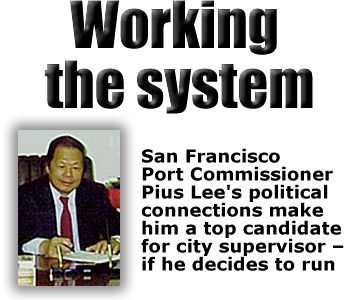

When San Francisco Mayor Willie Brown went to Chinatown in early 1999 to kick off his campaign for re-election, there was one man he sought out above all others: Pius Lee.
Lee helped organize a $250-a-plate fundraising dinner that brought in an estimated $100,000 for Brown on February 10, helping the mayor to steal the march on his potential competition. "There are two ways to get the attention of politicians," Lee says, "with votes and money . . . We (Asian Americans) have money."
In a city where Asian Americans make up a third of the population and are projected to outnumber whites by 2017, Lee has become a key ally for ambitious San Francisco politicians. Although he won't admit to having plans to run for elected office himself, Lee would be a serious contender for a city supervisor's seat given his influence in the local Chinese American community.
Lee's list of public service appointments reads like a San Francisco government directory. Mayor Brown appointed Lee to the Port Commission in September. Lee has also served terms on the Chinatown Economic Development Group, the Industrial Welfare Commission and the Police Commission to name but a few.
Lee has ascended into the political elite of San Francisco by acquiring what he sees as the key components for success in American political life. Lee is a wealthy landlord in San Francisco, one of the most lucrative real estate markets in the country. He has also cultivated an extensive network of guanxi, or personal relationships, by advocating for issues of importance to Chinese Americans. Serving terms on a gamut of economic, social and government commissions in San Francisco has given Lee insight into the workings of the city. Among the dalliances arrayed around Lee's office is a piece of rusting shrapnel on his desk. The chunk was made from some of the 1,600 guns that were melted down as part of a gun buy-back program Lee helped organize during his term as police commissioner in 1992.
Asian Americans as a group, according to Lee, want to participate in mainstream America. Lee is working toward this goal, a version of the American dream with Chinese characteristics.
Take for example Lee's promotion of a bill on the importation of bullfrogs and turtles for human consumption. Lee says his backing for the law comes from his desire to protect a distinctly Chinese cultural phenomenon. "We want to eat fresh seafood," he explains, "not frozen." In his office, Lee
READ ON: Fleeing from the Communist revolution by swimming to Macao
Peter
Louis
Feng shui master
Phoebe
Man
21st century artist
Martin
Yan
Celebrity chef
Coming soon
In
late May, journalism students from
UC Berkeley will travel to
Hong Kong. Watch for their reports.